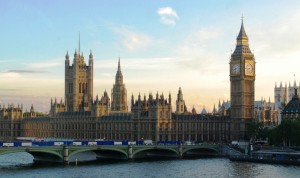Peers in the House of Lords have discussed the persecution of humanists around the world in a debate on freedom of religion and belief.
Lord Alton’s motion had asked that the Lords take note of Article 18 of the 1948 Universal Declaration of Human Rights – which stipulates that everyone has the right to freedom of thought, conscience and religion – and called upon the Government to make upholding freedom of religion and belief a greater priority.
During the debate, humanist peer Lord Harrison referenced the recent Voltaire Lecture, hosted by the British Humanist Association (BHA) and delivered by Bonya Ahmed, which he said ‘admirably highlighted’ the horror faced by humanist bloggers in Bangladesh at the hands of militant Islamists. Though nominally secular, Bangladesh has taken little action to address the persecution of its humanist writers, and three bloggers have been hacked to death by gangs of fundamentalists this year alone.

Harrison went on to urge the Government to ensure Article 18 is promoted in Europe also, asking for an update on the state of blasphemy laws in Malta, which has signalled it intends to follow the example of Iceland and abolish its longstanding restrictions on free expression. In 2012, Malta convicted 99 individuals for falling afoul of its blasphemy laws.
The End Blasphemy Laws Campaign, supported by the BHA, has been applying consistent pressure for all countries to abolish their blasphemy laws. Countries including Greece, Russia and Poland continue to use their blasphemy laws to restrict freedom of expression, whereas other European states have laws that are rarely employed but can be used by countries like Saudi Arabia to justify the imposition of brutal sentence for blasphemy.
The case of Saudi Arabian blogger Raif Badawi was brought to the Lords’ attention by Lord Alton, who had begun the debate by highlighting a number of cases of human rights abuses stemming from religious intolerance. Noting that non-religious people and those who advocate secularism are among those most frequently persecuted by restrictive regimes, he quoted the United Nations High Commissioner for Human Rights, who described Badawi’s sentence of 1,000 lashes for ‘insulting Islam’ as ‘a form of cruel and inhuman punishment.’ Alton also raised the case of Alexander Aan, who was imprisoned in Indonesia for two years for saying he does not believe in God.
Several other peers spoke in support of those who profess non-religious beliefs. Lord Palmer emphasised that religious freedom also involves ‘allowing one to give up one’s faith, to change one’s faith, or to have no faith,’ while former Archbishop of Canterbury Lord Carey said that the freedom to become an atheist ‘is among the blessings of being a human person’. There was a large degree of consensus between religious and non-religious peers on the importance of guaranteeing free expression, with Lord Harrison imploring atheists to ‘show solidarity with our religious colleagues over religious persecution.’
Another humanist peer, Lord Avebury, used his contribution to discuss the damage caused by ISIS, which he referred to as Daesh, saying that the elimination of ‘its metastases and its wicked ideology taught in Saudi-funded madrassas throughout the world must be the main goal of all who believe in freedom of religion.’
The debate also covered issues closer to home, with Baroness Howells arguing that within the UK there is ‘a trend that is moving to oppress the freedoms of religious minorities’. The Bishop of Leicester, in his valedictory speech, claimed that the presence of the Bishops in the House of Lords ‘serves rather than impedes religious freedom in countless ways.’
Lord Harrison responded by saying that it is actually those of non-religious belief who suffer routine marginalisation, pointing out humanists and atheists are still excluded from ‘Thought for the Day’, humanist groups are not permitted to take part in the annual Cenotaph commemoration and the Lords ‘still reserves a privileged place for the state religion’. Harrison ended his contribution by urging the Government to ‘ensure that the hopes and aspirations of non-believers like me are not suppressed by careless oversight when we take our rightful place in the public square.’
Baroness Anelay, speaking for the Government, told the Lords that ‘we oppose blasphemy laws wherever they still exist’. She said that the Prime Minister has raised concerns over Pakistan’s blasphemy law with the country’s Prime Minister, Nawaz Sherif, and is supporting EU-led efforts to apply pressure over the case of Asia Bibi – a Christian woman sentenced to death for blasphemy. Anelay did however express strong support for the continued presence of the Lords Spiritual in the chamber, saying only that they should be complemented by representatives from other faiths.
Commenting on the debate, the BHA’s Director of Public Affairs and Campaigns Pavan Dhaliwal said, ‘The continued presence of blasphemy laws around the world is a threat to the rights of people from all beliefs and backgrounds. The IHEU Freedom of Thought Report demonstrates that the non-religious are frequently the targets of these laws, while Bonya Ahmed’s recent Voltaire Lecture has brought home to us all the shocking reality of the persecution faced by humanists in some parts of the world. The freedom to express belief – and non-belief – is an essential part of democratic society, and it must be insisted upon with the strongest conviction.’
Notes
For further comment or information contact BHA Director of Public Affairs and Campaigns Pavan Dhaliwal at pavan@humanists.uk or on 0773 843 5059.
The End Blasphemy Laws website: http://end-blasphemy-laws.org/
The Freedom of Thought Report website: http://freethoughtreport.com/
Read the BHA’s briefing on Article 18 rights and the global persecution of the non-religious.
The British Humanist Association is the national charity working on behalf of non-religious people who seek to live ethical and fulfilling lives on the basis of reason and humanity. It promotes a secular state and equal treatment in law and policy of everyone, regardless of religion or belief.
